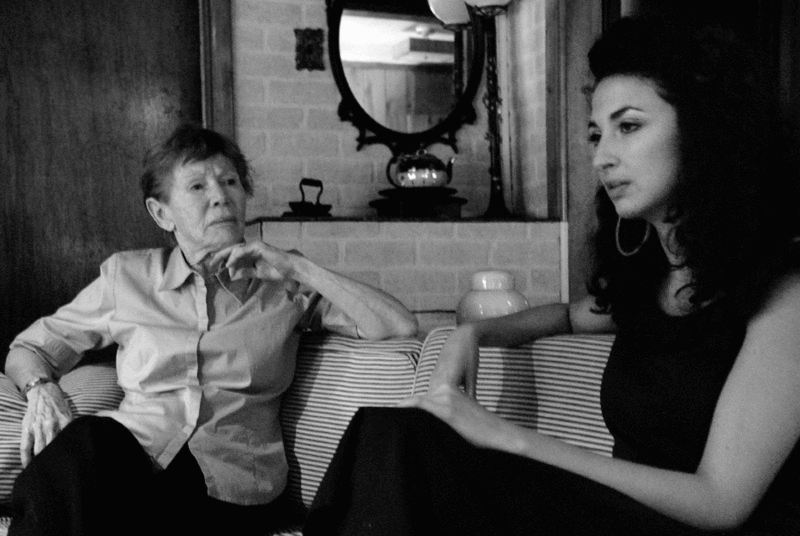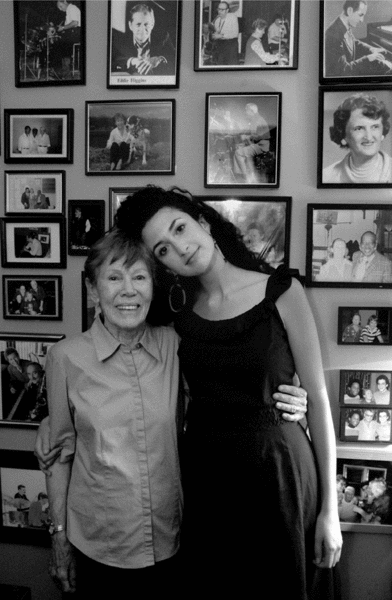One is a venerated Capital Region jazz legend, while the other is one of the most compelling young artists to come out of upstate New York in years. But 78-year-old pianist Lee Shaw and 23-year-old singer/songwriter Sarah Pedinotti share more than the music that has made one famous, and seems sure to touch the other with stardom.
For 10 years, Shaw has been Pedinotti’s teacher and musical mentor, helping her develop what by all accounts is a prodigious natural talent. Shaw met Pedinotti at One Caroline Street Bistro, the Saratoga Springs restaurant and jazz club owned by Pedinotti’s parents. From an early age, between waiting tables and general chores, Pedinotti cut her teeth on stage there. Her first two albums, in 2003 and 2005, were both on Billboard Magazine’s “10 Best New Albums” lists, and a sparkling performance at the 2006 Freihofer’s Jazz Festival created palpable excitement around her. A vocalist of remarkable power and subtlety, Pedinotti rejects being labeled a jazz musician, and devotes herself as much to writing her own songs as to interpreting those of others. Besides the expected influences of Billie Holiday, Bob Dylan, and Tom Waits, she names Allen Ginsberg, Walt Whitman, William Butler Yeats, and Kurt Vonnegut. Traces of all these artists can be heard on her newly released CD “City Bird,” a melting pot of influences from jazz to pop and even country, with heavy New Orleans seasonings.
But perhaps Pedinotti’s most intimate influence is Shaw, who has played and recorded with the likes of Anita O’Day, Dinah Washington, and Sarah Vaughan. Shaw’s mentor was Oscar Peterson, who played a key role in turning the young Oklahoma-born concert-piano student into a jazzer of international renown. Her Lee Shaw Trio has toured extensively in the US, Canada, and Europe, and has just released an exquisite CD, Originals. When not on the road or in the studio, Shaw teaches at The College of Saint Rose in Albany and gives private lessons. Her most famous student, at least for the time being, is John Medeski, keyboardist with Medeski, Martin and Wood.
Though the muse-beautiful Pedinotti is not a pianist, she nevertheless says Shaw’s impact on her career was “like hitting the jackpot.” In July, Chronogram brought the two musicians together to talk about art, performing, and friendship. They met at Shaw’s home overlooking the Mohawk River, just as a huge thunderstorm broke over the region. They were like two long-lost comrades, laughing, touching each other affectionately, often taking over from the interviewer, who simply listened with pleasure as the two women vamped on their life in music. That first meeting, and subsequent phone calls, have been combined into the interview below.
As the dusk fell in Shaw’s home and the interview came to an end, the mentor and her protégée sat for photos at the piano and spontaneously, almost impulsively, began to perform. They played two songs, the old Sinatra tune “Everything Happens to Me” and the Holiday standard “God Bless the Child.” The music was sublime, enchanting, pure magic. They do not perform publicly together, but regularly appear individually around the region. Pedinotti will be at WAMC’s Linda Norris Auditorium in Albany on September 15, while Shaw plays the Castle Street Cafe in Great Barrington on September 20, and Justin’s in Albany on September 23. For more information, both women have websites: www.sarahpedinotti.com and www.leeshaw.org.
David Malachowski: Tell me how you met.
Sarah Pedinotti: I was 13 when I met Lee. We started out playing together at my parents’ club. She took me under her wing, and explained to me how a singer is not just a singer, a singer should be a musician. Out of all the performers who played at One Caroline Street, there was something about Lee that I respected immediately. There was something supernatural about it when Lee was playing—the energy she gave off, the way she really communicated with an audience. And for a pianist—she doesn’t even have the lyrics—it’s tactile. She’s a poet in a way.
Lee Shaw: Sarah was an incredible presence, this skinny, sweet little kid. From the beginning, she knew the keys of all her songs.
Pedinotti: (laughing): Well, you told me to get a little black book and write down all the songs I know and put the keys next to them. You really whipped me into shape!
Shaw: It was obvious that she loved to sing, and she listened, which is the most important thing.
Pedinotti: One of the greatest things Lee’s taught me is you never stop learning. She’s like a Yoda. (Looking at Shaw) You don’t talk backwards, but you can play backwards! She’s like a wizard!
Shaw: I never had the sense that you were copying anybody. One of the things I admire you for the most is that you are your own person, you listen to the sound of your own drummer.
Lee, what advice would you give Sarah about the musician’s life and how to handle fame?
Shaw: I don’t think Sarah has any problem knowing what is important to her and what she wants. Sarah is extremely honest with herself. She wants a long, successful career, but she wants it to remain honest, she doesn’t want to be pushed in any direction just for the sake of success. The way she looks, and with her talent, there are going to be a lot of people who are going to say “Why don’t you do this?,” and “Why don’t you do that?” If you want to have a long career, you have to know what your own directions are, and not be influenced by the lure of glamour or acclaim. And that she already has.
Pedinotti: Sometimes it’s hard to know who you are. Many people today struggle to define themselves, they want to be seen as different. But I feel it’s more important to focus on our common threads, what ties us all together. I may not know who I am, but I know what makes me human and I need to trust that. The trick is to empathize with everyone, let them inspire you, become them, but don’t ever let them steal you away.
What was it like in the early days, Lee, as a woman in the mostly male jazz world?
Shaw: I’ll give you some quotes: “Gee, you play good for a girl.” Once, at Grossinger’s: “How much money do you make?” Or in interviews, they’d assume, since I’m female, I have to sing. Very often you’d see, “Lee Shaw pianist-singer.” I sound like a crow! I was always playing with men, I don’t recall having played with a woman bass player or drummer, but very often at a club, playing with two horn players, bass and drums, whether I was leader of the group or not, it didn’t matter, the men—the horns—would take a solo, the bass would take a solo, the drummer would do fours, and then the horn players would go out, and leave me out! So I was functioning simply in the rhythm section.
What was your reaction to this?
Shaw: Standing up for myself. I would just butt in and take the chorus myself, or say “I’m here too.” Things have changed greatly. I think it was the women’s movement in the ’70s that influenced that. Throughout history, women have been second-class citizens, and in so many places, still are.
Pedinotti: There’s this thing on Lee’s wall that says, “Lee Shaw looks like a fox, plays as good as a man.” I was about 18 when I first read that, and I was furious. Lee was very graceful about it when I read it out loud with disgust. She said “Times were different back then. Now, even if someone thought that, they would never be allowed to print it.” I learned an important lesson from her then.
Sarah, you performed all through high school, then you left, went to Berklee from 2003 to 2005 and attended Harvard. What did you learn during those years away from the stage?
Pedinotti: I took some classes [at Harvard] for a year in 2005-2006, after I dropped out of Berklee and was still hanging around Boston. I took philosophy and creative writing courses and an anthropology and human rights course. I was really happy taking time off. During that time, I was writing such different material, I was so inspired. I learned there’s something musical about anthropology, and finding music in things that are not musical is exciting.
Now that you’re experiencing some success, what’s life like for you?
Pedinotti: I’m really excited now that I don’t have to wait tables. It’s really funny trying to be a waitress and a singer. I was a lousy waitress, but when I played, it was like “Ahhh, everything is okay, we’re in the song. I get to sing about having the blues and being broken-hearted, and emote and be an artist and this character.”
You don’t like being called a jazz singer. How do you describe yourself?
Pedinotti: It’s been a challenge with what to label it. I just have to ignore what it’s called and just do it—do what I do and let other people decide how to market it. I have such great respect for jazz music. What I do now is singer/songwriter, but the tunes that I write, there’s a lot of jazz in there.
What are your artistic goals?
Pedinotti: I want to really get into writing. I’m not really a fortune-teller, but I hope to have a thousand original songs. I have a little over a hundred now. The more you write, the more you develop. It’s almost like you’re working on one piece.
This one’s for each of you: Why music?
Pedinotti: It’s the storytelling aspect that is important to me. I think of people like Woody Guthrie, who was telling the story of the dust-bowl era. He was important to liven up a country full of very depressed people in a grim time. In that desperate time, it shows you the power of the music—a guy traveling with just a guitar—to get people inspired to want to live. Music has a transformative quality. We are living in a very disturbing moment in history and I cannot suppress the disquietude of our age. Hence the need for the healing, transformative power of music and poetry. I just need it to stay sane.
Shaw: I’ve always tried to play each song as though it was the last song I’ll ever play. You let the music get inside you. You’re clearly a vehicle. Music to me is like breathing. It’s that important.



















